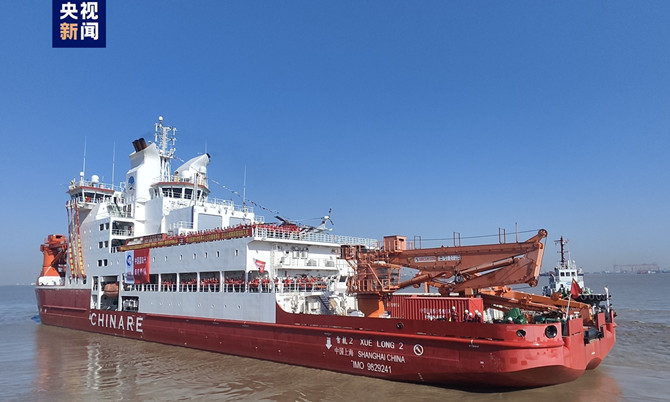The 40th Chinese Antarctic research expedition set sail on Wednesday. With a scientific research journey scheduled to last for more than five months, the expedition's key task is building a new Antarctic station near the Ross Sea, which will be China's first research station dedicated to the Pacific sector and is planned to be finished by February 2024.
The expedition team is comprised of more than 460 researchers from over 80 domestic institutions and is being led by three ships, including two icebreakers Xuelong and Xuelong-2 which set off from Shanghai with tasks of conducting scientific research, carrying researchers and delivering basic supplies, in addition to cargo ship Tianhui, which left from the city of Zhangjiagang in East China's Jiangsu Province which will transport construction materials for the new research station.
The new base is located in the coastal region of the Ross Sea in the east Antarctic and covers an area of 5,244 square meters, said Sun Bo, the Party head of Polar Research Institute of China which is responsible for the construction of the new station, Beijing News reported.
It can accommodate about 80 research personnel in summer and 30 people in winter and is planned for implementing multi-layer, multi-disciplinary observational and scientific research work including the atmospheric environment, marine basic environment, and biological ecology.
According to Sun, members of the scientific research team will arrive at the station to complete unloading and installation work in mid-December, with plans to complete the construction task within 60 days.
The new Antarctic base will be China's third permanent research station after the Zhongshan Station and Great Wall Station. It will be China's fifth research station in Antarctica.
Besides the construction of the new base, the expedition team will conduct investigations on the impacts of climate change on the Antarctic ecosystem. In the Prydz Bay, Amundsen Sea, the Ross Sea in the west Antarctic, the Astronaut Sea, and adjacent waters located near the Antarctic Peninsula, researchers will carry out comprehensive surveys and monitoring of biological ecology, the environments of water, sediment and atmosphere, as well as the distribution of pollutants.
The monitoring of ecosystems, as well as the environments of nearshore marine, soil, geology, atmosphere, snow and ice, and space, will be also conducted by the usage of the Kunlun Station, Zhongshan Station, and Great Wall Station to study the role of Antarctica in global climate change.
International cooperation is also important to the mission. This will include frontier research in partnership with Norway and Australia, as well as supply cooperation with the US, the UK, Australia, Italy, South Korea, Russia and Chile.
Source:
Global Times
The opinions expressed herein are the author's and not necessarily those of The Xinde Marine News.
Please Contact Us at:
media@xindemarine.com


 Ningbo Containerized Freight Index Weekly Commentar
Ningbo Containerized Freight Index Weekly Commentar  Ningbo Containerized Freight Index Weekly Commentar
Ningbo Containerized Freight Index Weekly Commentar  Ningbo Containerized Freight Index Weekly Commentar
Ningbo Containerized Freight Index Weekly Commentar  BIMCO Shipping Number of the Week: Bulker newbuildi
BIMCO Shipping Number of the Week: Bulker newbuildi  Ningbo Containerized Freight Index Weekly Commentar
Ningbo Containerized Freight Index Weekly Commentar  Ningbo Containerized Freight Index Weekly Commentar
Ningbo Containerized Freight Index Weekly Commentar